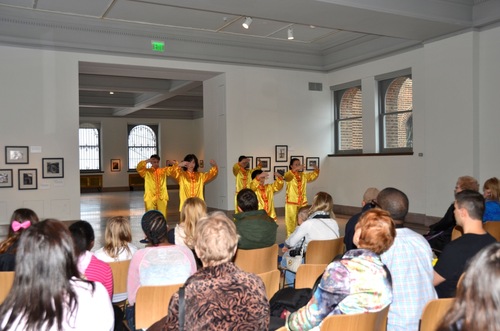University of Pennsylvania: Falun Dafa Practitioners Usher in the Year of the Horse (Photos)
(Minghui.org) The Museum of Archeology and Anthropology at the University of Pennsylvania held a series of Chinese New Year celebrations. Local practitioners joined the events by introducing Falun Dafa and demonstrating the five sets of exercises.

 Practitioners demonstrate the Falun Dafa exercises at the Museum of Archeology and Anthropology at the University of Pennsylvania during Chinese New Year events.
Practitioners demonstrate the Falun Dafa exercises at the Museum of Archeology and Anthropology at the University of Pennsylvania during Chinese New Year events.
Practitioner Jessica began her practice of Falun Dafa in 2001 when she was a postdoctoral researcher at a university hospital, where a doctor recommended Falun Dafa to her. She benefited greatly from the practice. “Besides becoming healthy, the practice has allowed me to progress at a spiritual level. It has made me a kinder and wiser person,” said Jessica.
Cindy from Bucks County, Pennsylvania watched the exercise demonstration and recorded it with her smart phone. She said that she saw practitioners demonstrating the exercises in Santa Barbara last April, and became very interested in the meditation part. She said that she would visit the Falun Dafa website after she returns home to learn the exercises.
Cindy was deeply disturbed upon learning about the persecution in China and the Chinese regime’s crimes of harvesting organs from living Falun Dafa practitioners. She said, “I don’t understand. There's nothing wrong with practicing Falun Dafa. China’s totalitarian regime fears independent thoughts and mind. Organ harvesting is an act as evil as the Nazis.'”
Marj said that she felt very peaceful and calm when she saw the exercises. She was amazed by the impact of the energy field, as normally it isn't easy for her to calm down. She was interested in learning the practice.
The Museum of Archeology and Anthropology at the University of Pennsylvania was established in 1887, and is known for multicultural exchanges and research on human history.